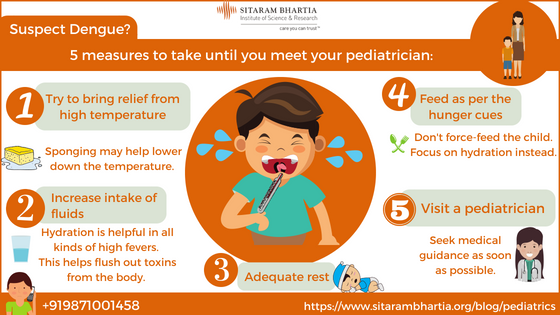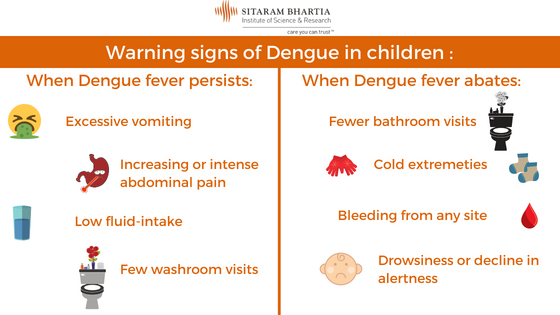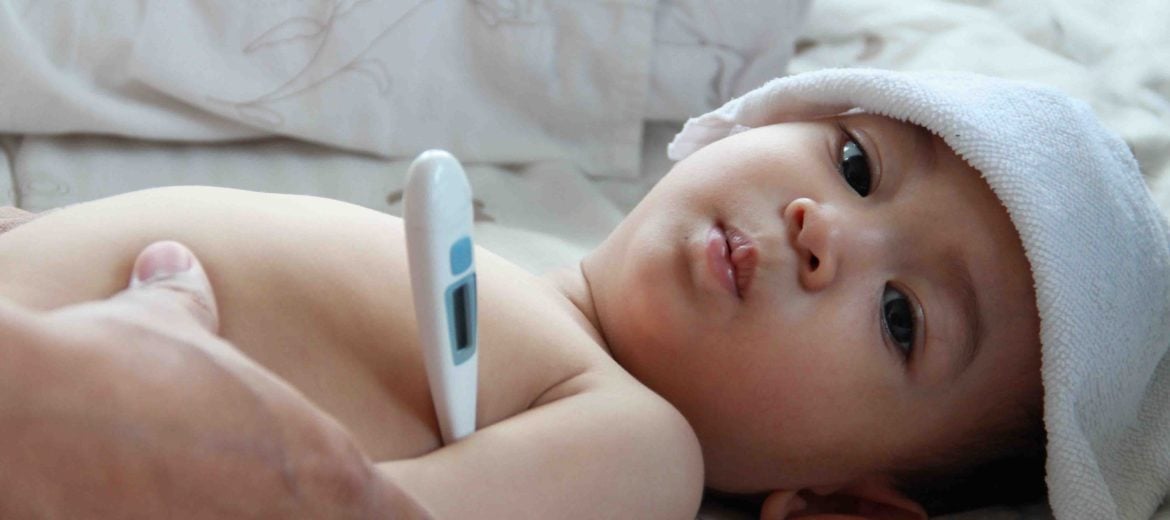Dengue symptoms in your child can be difficult to read.
Dr Neha Joshi, Consultant, Pediatrics at Sitaram Bhartia Hospital says, “As dengue symptoms in children are similar to those in less severe fever infections, it can be difficult to differentiate between them without a blood test”
“Your child may not be able to express or verbalize their complaints. You, therefore, need to be more vigilant to observe any symptoms.”
Watch out for these dengue symptoms in children, irrespective of the age of your child:
- Sudden onset of high fever
- Immense discomfort during fever
- Poor response to fever-relief preparations
- Appearance of red, pin-like dengue rashes during fever
- Loss of appetite
“Apart from high fever, your child may experience intense body ache similar to broken bones. For this reason alone, dengue was earlier known as breakbone fever” highlights Dr Neha.
“Dengue rashes may not appear in every case of dengue. Therefore, you shouldn’t rely on absence of rashes as a definite sign to rule out the possibility of the disease.”
Dengue Symptoms in Infants
Since infants are unable to express their ailment, you should keep an eye out for these particular dengue symptoms in child:
- Crankiness or fussiness even when the temperature lowers down
- Increased clinginess or desire to be held in lap
“If you suspect that your infant is down with dengue, gently massage their limbs. This can provide them great relief and can help calm them down” advises Dr Neha.
Dengue symptoms in Toddlers
Toddlers may show:
- Decreased enthusiasm to favourite toy or activity
- May point to areas that ache like throat, hands, feet
Dengue symptoms in Adolescents
Adolescents are able to express their discomfort and will complain of:
- Body ache
- Headache
- Restlessness
- Pain behind the eyes
- Adolescent girls affected by dengue virus may experience a heavier and prolonged menstrual cycle
“If your child seems increasingly irritated or listless which seems out of proportion to the temperature of the fever then it could be an indication of dengue” emphasizes Dr Neha.
“If you notice these symptoms between July-October, you should seek medical guidance.”
What to do till you get to a doctor?
Dr Neha advises, “If you can’t approach a doctor right away, you should make sure that your child is comforted and kept hydrated till a diagnosis has been made”
Here are five things that might help you meanwhile:

- Try to bring relief from the high temperature:
Some over-the-counter fever relief medicines may help lower down the high temperature.
Dr Neha emphasizes, “Avoid ibuprofen-based medicines and give medicine as per the age and weight of your child”
Creating a cool and comfortable environment for your child is also equally important. You could also try sponging to bring relief from high temperature.
“You should be patient. Remember, the medicines will take some time to have an effect. Don’t give medicines frequently and maintain safe gaps between the doses preferably, around 6 hours.”
Children especially toddlers have a tendency to resist medication or even puke them out. This may result in loss of water, so you could try giving medicines by disguising the taste.
- Increase intake of fluids:
Even if the diagnosis hasn’t been confirmed yet, keeping your child hydrated is helpful in any case of high fever.
“Hydration is vital in management of dengue. Even if it turns out to be something else later, increased liquid intake is beneficial in any case of high fever” says Dr Neha.
- Adequate rest:
Parents should make sure that their child gets adequate rest. Create a comfortable environment for your child which encourages sleep and rest.
- Feed as per the hunger cues of your child:
With high fever, children usually tend to lose their appetite.
Dr Neha adds, “The important thing is not to force feed your child as it might make them uncomfortable and irritable”
“Feed your child as per their hunger cues like willingly accepting or asking for food. Make sure that they are well-hydrated at all points.”
- Visit a pediatrician as soon as you can:
“A clinical examination and blood test is vital to rule out the possibility of dengue”
Most parents believe that when the fever abates, the child has recovered from dengue.
“The critical phase of dengue actually begins after the fever settles and may last 24 – 48 hours”
In this phase, blood vessels may start to leak out water in the body which results in reduced blood volume in the vessels.
“Even if your child’s fever abates, you should still visit your pediatrician to be on the safe side” asserts Dr Neha.
Since dengue is a dynamic disease, complaints associated with dengue and severity may change anytime which makes early identification and constant vigilance even more important.
What to Expect with a Pediatrician
How do you diagnose dengue fever?
After a clinical examination of the symptoms, your doctor may advise a blood test.
This test helps understand the probability of dengue virus in your child’s system.
A blood test is desirable after 24 hours of high fever.
What are the warning signs of dengue?
Early identification of warning signs of dengue can help in timely interventions.
The warning signs of dengue can appear anytime – it could be before a confirmed diagnosis and even after the diagnosis i.e. during management of dengue.
Dr Neha highlights, “If you notice any of these warning signs, please visit your pediatrician as soon as possible”
Use the graphic below to identify warning signs of dengue:

Signs of bleeding like black, tarry stool, bleeding from the nose or gums or the urine turning cola-colored or red are also warning signs.
“Predicting the course of dengue fever is difficult. So if you notice warning signs in your child, you should contact your pediatrician right away” emphasizes Dr Neha.
Conclusion
“Timely identification of dengue symptoms and a treatment plan after consulting a pediatrician can greatly improve your child’s health and recovery” concludes Dr Neha.
If you have any questions on Dengue, please Chat with us on WhatsApp to schedule a consultation with Dr. Neha Joshi.



